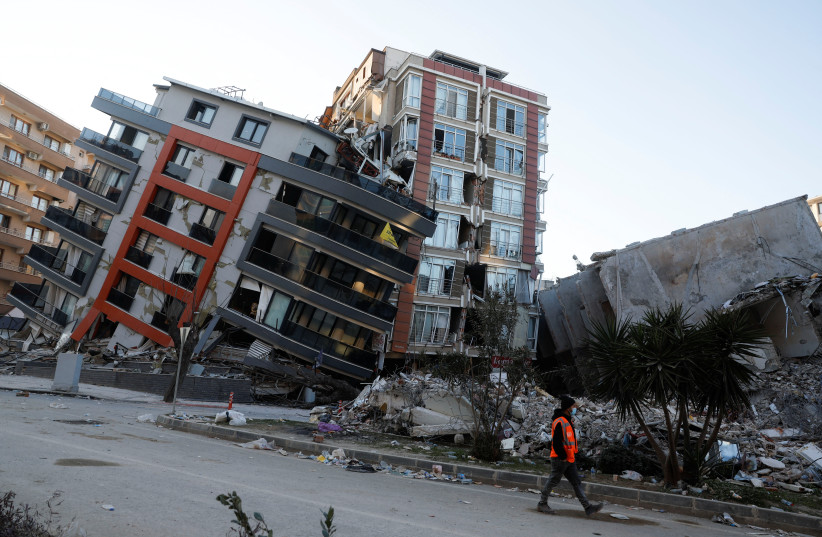Members of the World Trade Organization (WTO) have stepped up to offer aid to help alleviate the humanitarian crisis in Turkey and Syria, the WTO’s director general said on Monday at the World Government Summit, a conference dedicated to shaping the future of governments.
For more stories from The Media Line go to themedialine.org
The summit, running from February 13-15, will include the participation of presidents such as Egyptian President Abdel Fattah el-Sisi and Paraguayan President Mario Abdo Benítez, as well as government ministers and officials, heads of international organizations and companies, thought leaders, global experts and prominent business leaders from the private sector representing around 100 economies.
The World Government Summit is an annual event held in Dubai, United Arab Emirates, that brings together leaders and experts from various fields to discuss global challenges and propose solutions for shaping the future of government. It was first held in 2013 and since then it has grown into a significant platform for policymakers, thought leaders and innovators to share their ideas and experiences. The summit, this year under the banner of “Shaping Future Governments,” covers a wide range of topics, including artificial intelligence, climate change, health care and education. Its aim is to foster collaboration and encourage innovation toward building a better future for humanity.
Nigerian economist Ngozi Okonjo-Iweala, who serves as WTO director-general, said on Monday that many of the countries that belong to the WTO have systems in place to send aid when disaster strikes, referring specifically to last week’s earthquakes that left at least 37,000 people dead in Turkey and Syria.
Trade in 2023 faces challenges from earthquakes, climate change, COVID and Russia-Ukraine war
Turning to the global economy, Okonjo-Iweala told participants at the summit that trade in merchandise is expected to grow by 1% this year, a drop from 3.5% last year.

Trade is facing challenges after the coronavirus pandemic, such as Russia’s war on Ukraine, the earthquakes in Turkey and Syria and the impact of climate change. “All of these things have had an impact,” she explained.
She also said that the WTO’s trade dispute arbitration system needs reform and that it will be a priority of the organization.
“There seems to be glimmers of hope on the horizon,” she said, explaining that the United States is leading technical discussions meant to lead to reform of the dispute system that will take into account the worries not just of the US and the European Union, but also of poorer countries.
“It’s not only the US that has problems. Developing countries, especially the least developed, find it hard to access the system and costly,” she added.
The trade organization chief said that governments must build resilience globally rather than looking at countries nearby, and must expand beyond China.
“Building resilience globally is probably safer,” Ngozi Okonjo-Iweala said, adding that there is resilience globally within the supply chain.
Kristalina Georgieva, managing director of the International Monetary Fund (IMF), told the summit that the markets globally should be more “upbeat” as China opens up and the US economy appears “likely” to avoid recessions.
"The markets have good reason to be more upbeat because what they are finally seeing is the US economy likely to avoid recession ... they are also seeing China reopening and Chinese consumers rushing to spend the money they saved during the pandemic, the lockdown," Georgieva said.
"The markets have good reason to be more upbeat because what they are finally seeing is the US economy likely to avoid recession ... they are also seeing China reopening and Chinese consumers rushing to spend the money they saved during the pandemic, the lockdown."
Kristalina Georgieva
She said that Gulf countries are working "relentlessly" to ensure fiscal reforms, which includes diversifying revenue sources by introducing new taxes.
“There are reasons to be more optimistic,” she added. The IMF chief said that the diversification of economies is what will be driving the countries’ economic growth.
Asked about the choice of the UAE of Sultan Al Jaber, CEO of the Abu Dhabi National Oil, to serve as the chair of the COP28 – the 2023 United Nations Climate Change Conference, Georgieva said: “Our focus is on what needs to be done and how we can do it together. We talk about an inclusive approach to fighting the climate crisis.”
“Inclusive is exactly that: All hands on deck," she added.
